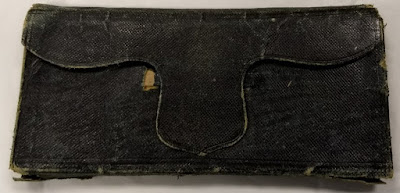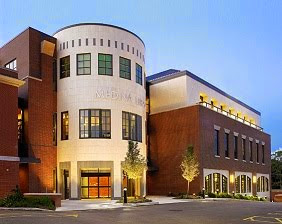The first installment of family history research how-to's that will be posted once every month in 2019.
GETTING STARTED
1. Preliminary guidelines:
- Research from the known, you, in the present, and work your way backward into the past.
- NEVER start researching from a famous "relative" or story and try to make them fit into your family.
- You do have to know what you are looking for Or you will find anything that looks good, whether it is your family or not.
- Evaluate ALL your information. Is is it from a reputable source? What was the purpose in creating the information?
- Don't rely 100% on the Internet! A lot of information on the Internet is WRONG, having been uploaded by misguided or inexperienced researchers. And eventually, you will find that some of the information you need is NOT on the Internet. People did genealogy for thousands of years before the Internet!
- Document where you find your information. You may need to retrace your steps. And you ALWAYS want to be able to tell others where you found the information.
- Learn how to spell genealogy G-E-N-E-A-L-O-G-Y
2. Start with yourself - To get started in family history research, you need to start at the beginning, at YOU, and work backwards in time.
So many of us don't start here and chose instead to focus on a family story or a famous "relative". But a misstep early in your quest can derail you in unimaginable ways.
So, how do you start with you? You know everything there is to know about you, right?
Yes, you do. But can you
DOCUMENT every fact about your life? Just like when you are applying for a driver's license or a passport or a car loan, you need to provide proof of the facts of your life.
So, go digging through those desk drawers and boxes stashed away in closets or the basement, and start documenting your life!
What kind of information should you be looking for? The same information that you want to collect on all your ancestors:
- Full name including women’s maiden names - found on birth and marriage records
- Date and place of birth - found on birth records
- Date and place of marriages & divorces - found on marriage records
- Date and place of death & burial - found on death records
- List of siblings and children
3. You can use these
handy charts to start organizing the information you are gathering into one location.
 |
| An Ancestry Chart like this one lets you see multiple generations at a glance. |
 |
| A family group sheet displays more detailed information on each individual. |
Similar forms and many others are available on the Ancestry.com web site
HERE.
GUIDELINES FOR FILLING OUT THE CHARTS:
- Use a pencil to fill in the information, so that it can be corrected, if needed.
- Last names are written in ALL CAPS. This makes them stand out and makes it easier to find the name you are looking for.
- Women are always listed under their maiden names.
- Dates are entered day/month/year (from the smallest unit, a day, to the largest unit, a year)
- Places are listed as city or township/county/state/country (again listed from smallest to largest unit)
4. But if that is all you have in your history, it will be very boring. Use these
additional sources to start filling in the gaps and make your family history come alive!
Adoption Records
Baby Announcements
Baby Books
Baptism Records
Birth Certificates
Citizenship Papers
Confirmation Record
Death Announcements
Death Certificates
Diaries & Journals
Diplomas
Discharge Papers
Divorce Papers
Employment Records
Family Bibles
Family Business Papers
Family Stories
Family Letters
Family Pictures
Funeral Guest Books
Graduation Records
Heirloom Jewelry
Immunization Records
Income Tax Forms
Insurance Records
Land Records
Marriage Records
Military Awards
Mother's Certificates
Naturalization Papers
Newspaper Clippings
Obituaries
Oral Histories
Photo Albums
Property Tax Receipt
Report Cards
Resumes
School Records
Scrapbooks
Social Security Cards
Wedding Albums
Wedding Guestbook
Wills & Estate Records
Yearbooks
Now you are ready to start gathering information on your extended family; spouses, children, parents, siblings and grandparents.
INTERVIEWING RELATIVES
5. Collect family stories and personal testimonies. These should be verified in other sources. Talk to all of your relatives, particularly the older ones, and collect family stories and information from them.
a. Interview the oldest relatives as soon as possible. ALL of us have missed interviewing a relative because of dementia or early death. Who knows what information was lost.
b. Be considerate of the person you are interviewing.If they get tired, reschedule. If they don't want to talk about a certain subject, move on to something else. Don't interrupt too often.
c. Set up an appointment and be prepared. Have all the tools you will be using handy:
1) Notebook, pencils and extra forms
2) Camera & spare batteries
3) Memorabilia to share and trigger memories
d. Ask open ended questions to trigger more information. "What was your grandfather's name?", not, "Was your grandfather's name John Mason?"
e. Thank your relative for helping you.
f. Follow up by sharing new information with your interviewee.
Topics to ask about:
Full Name
Parents
Siblings
Childhood Home
Family Relations
Hobbies
Family Income
Seasons & Special Occasions
Religion
Birthdate & Place
Marriage
Children
Politics
Military
Friends
Schools
Games
Career
Hometown
Historic Events
Family Traditions
Sports
AND… Be sure to ask if anyone else has ever worked on the family history!
LEARN MORE ABOUT THE PROCESS OF FAMILY HISTORY RESEARCH
6. First of all, get acquainted with t
he help that is already available to you. Most major genealogy web sites have a how-to or wiki section. And the Medina County District Library has several useful aids to get you started:
a. From our web site:
Medina County District Library Genealogy- Getting Started
b. In our genealogy/local history area we have a very concise and useful kit:
 |
Available in the local history genealogy area, the Kit contains basic
instructions, useful forms and lists of other sources. |
c. The Library also has a collection of very helpful books. These are recommended for beginners:
1)
Cite Your Sources and
Evidence Explained - guides you in always documenting the source of your information. An essential step in any research project.
2)
Complete Idiots Guide to Genealogy - don't take the title personally! Like all the
Idiot and
Dummy books they explain the process as if you are starting from scratch.
3)
Genealogy Online - so much research can be done online. Just not ALL of it!
4)
How to Do Everything with Your Genealogy - a highly readable but comprehensive guide to the search.
5)
International Vital Records Handbook - this 2018 edition lists where to find the essential records throughout the U.S. and most of the rest of the world.
6).
Unpuzzling Your Past - is a more compact coverage of the research process and includes many useful forms and examples.
d. Take classes. Libraries, and local & state genealogical societies frequently offer classes for a skill levels of family history researchers.
1) The Medina County District Library list their classes on the
EVENTS tab on the web site.
2) The Medina County Genealogical Society incorporates classes into their monthly meetings. To find out what is coming up, contact them at
MCGS.
3) The
Ohio Genealogical Society is one of the largest state genealogy organizations. Their excellent conferences and classes can be viewed under
EVENTS.
4) The Akron Summit County Public Library offers great classes also. Their current listing can be found
HERE.
NEXT MONTH, LISA WILL COVER ORGANIZING YOUR RESEARCH AND KEEPING IT ORGANIZED
Thank you Jay for making this post better!
























